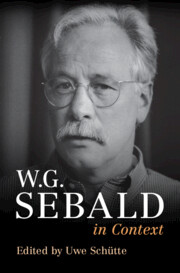Book contents
- W.G. Sebald in Context
- W.G. Sebald in Context
- Copyright page
- Dedication
- Contents
- Illustrations
- Notes on Contributors
- Preface
- Acknowledgements
- Note on Text
- Chronology
- Abbreviations
- Works by W.G. Sebald
- Part I Biographical Aspects
- Part II The Literary Works
- Part III Themes and Influences
- Chapter 17 Critical Writings
- Chapter 18 Minor Writing
- Chapter 19 Franz Kafka
- Chapter 20 Literary Predecessors
- Chapter 21 Walter Benjamin
- Chapter 22 Philosophical Models
- Chapter 23 History
- Chapter 24 Polemics
- Chapter 25 Holocaust
- Chapter 26 Photography
- Chapter 27 Paintings and Ekphrasis
- Chapter 28 Media Theory
- Chapter 29 Travel Writing
- Chapter 30 Ecocriticism and Animal Studies
- Part IV Reception and Legacy
- Further Reading
- Index
Chapter 19 - Franz Kafka
from Part III - Themes and Influences
Published online by Cambridge University Press: 24 August 2023
- W.G. Sebald in Context
- W.G. Sebald in Context
- Copyright page
- Dedication
- Contents
- Illustrations
- Notes on Contributors
- Preface
- Acknowledgements
- Note on Text
- Chronology
- Abbreviations
- Works by W.G. Sebald
- Part I Biographical Aspects
- Part II The Literary Works
- Part III Themes and Influences
- Chapter 17 Critical Writings
- Chapter 18 Minor Writing
- Chapter 19 Franz Kafka
- Chapter 20 Literary Predecessors
- Chapter 21 Walter Benjamin
- Chapter 22 Philosophical Models
- Chapter 23 History
- Chapter 24 Polemics
- Chapter 25 Holocaust
- Chapter 26 Photography
- Chapter 27 Paintings and Ekphrasis
- Chapter 28 Media Theory
- Chapter 29 Travel Writing
- Chapter 30 Ecocriticism and Animal Studies
- Part IV Reception and Legacy
- Further Reading
- Index
Summary
Sebald virtually identified with Kafka. He published two substantial essays on The Castle, inspired by Walter Benjamin. Foregrounding the theme of death, he draws on Freud’s ambivalent concept of the death-drive, and associates Kafka also with Schubert’s Winterreise. Drawing implicitly on Canetti’s Crowds and Power, he interprets the protagonist of The Castle as a messianic figure seeking to confront the Castle’s power. Another essay uses Kafka’s ‘Report to an Academy’, with its Darwinian implications, as pretext for a meditation on cultural and evolutionary decline. In Sebald’s fictional works, Kafka is present throughout much of Vertigo, which in part follows Kafka’s own journey through Northern Italy from Venice to Lake Garda and alludes to Kafka’s ‘The Huntsman Gracchus’, set in the lakeside town of Riva. Sebald explores Kafka’s state of mind, as attested in letters and diaries, returning to the theme of death and also hinting at Kafka’s possible homosexuality. In Austerlitz, a significant quotation from The Trial is worked into the text. Altogether, much of Sebald’s work represents a homage to Kafka.
Keywords
- Type
- Chapter
- Information
- W. G. Sebald in Context , pp. 168 - 175Publisher: Cambridge University PressPrint publication year: 2023

